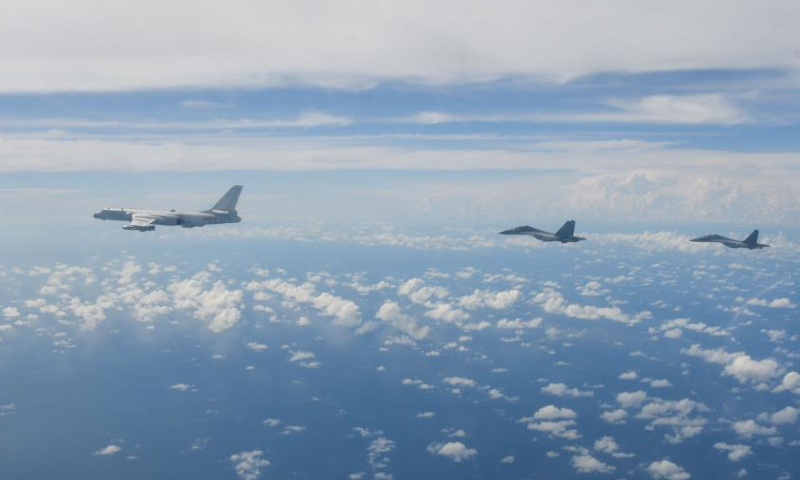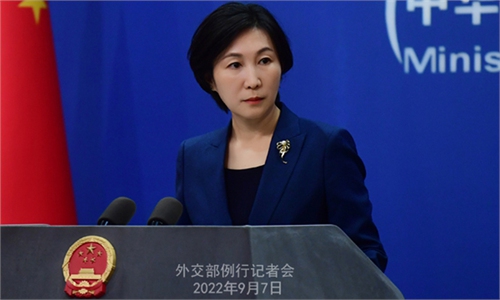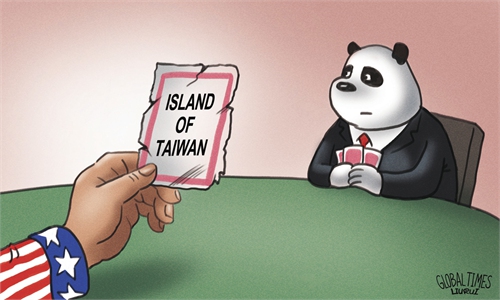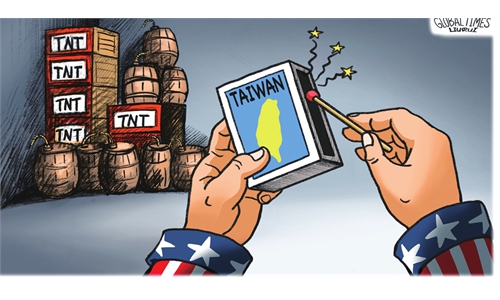Taiwan secessionists’ rhetoric on US ‘weapons depot’ ‘self-deceiving,’ justifying US arms dealers’ draining island economically before reunification

Warplanes of the Eastern Theater Command of the Chinese People's Liberation Army (PLA) conduct operations during joint combat training exercises around the Taiwan Island, Aug. 7, 2022. The Eastern Theater Command continued its joint combat training exercises as scheduled on Sunday in the waters and airspace around the Taiwan Island. Photo: Xinhua
Following a provocative speech by Taiwan regional leader Tsai Ing-wen who claimed that the island is increasing mass production of precision missiles and high-performance naval vessels, the pro-secessionists media on the island welcomed recent remarks made by US officials of building a "giant weapons depot" on the island of Taiwan to resist potential attacks, which mainland experts said is self-deceiving.
Experts believe that the US and the DPP authorities' saber-rattling collusion is aimed at portraying the Chinese mainland's legitimate anti-secession moves as a "threat." And the "weapons depot" is nothing but a tool for justifying US arms dealers to drain Taiwan authorities dry economically before reunification, with targets destined to be destroyed by the People's Liberation Army (PLA).
Citing current and former US officials, The New York Times recently said that Washington is intensifying efforts to build a "giant stockpile of weapons" on Taiwan island after studying the PLA's exercises encircling the island, which were triggered by US House Speaker Nancy Pelosi's provocative visit in August.
Some Taiwan-based media, citing secessionist observers, welcomed the US idea on Monday, saying that stockpiling weapons in Taiwan island would be a "logistical asset," as they can immediately be obtained from the depot, without waiting for weeks to get them.
According to The New York Times, US officials, who were not named in report, are determining the quantity and types of weapons sold to Taiwan island by quietly telling DPP authorities and US arms makers that they will "reject orders for some large systems" in favor of "a greater number of smaller, more mobile weapons."
They said the goal is to "ensure that Taiwan has enough arms to defend itself until help arrives."
The US wants to force the Chinese mainland to abandon the idea of "reunification by force" by sending out the signal of arming Taiwan and enhancing Taiwan's military power, which they believe may increase the psychological pressure of decision-making, Yuan Zheng, deputy director and a senior fellow of the Institute of American Studies at the Chinese Academy of Social Sciences, told the Global Times on Tuesday.
Such hype over creating an "arms depot," which is in opposition to the mainland's anti-secession moves are the main factor causing tensions across the Taiwan Straits, Yuan said. "The US and the DPP authorities on the island want to shift theresponsibilities."
According to Yuan, the number and frequency of US military advisers sent to Taiwan to train forces is likely to rise in the future. Direct US military involvement in the operation of military equipment in Taiwan cannot be ruled out.
Chinese military expert Song Zhongping believes that the idea of a "weapons depot" is completely unrealistic and the US officials' claim that this depot would "ensure Taiwan's self defense until help arrives" is a lie.
The idea of a weapons stockpile is actually asking Taiwan authorities to buy more weapons and equipment in large quantities, even including some that are not normally used, to fill the pockets of American arms dealers with more money, Song said.
"The depot would be a target destined to be destroyed by PLA in wartime, which means no matter how much money Taiwan authorities spend, it would be a waste of money," Song said.
The US is trying to drain Taiwan authorities economically before reunification. As for the people in Taiwan, this would be a disaster, Song said.
The latest US arms sale to Taiwan authorities under the Biden administration was a $1.1 billion package announced on September 2, which includes 60 Harpoon coastal anti-ship missiles.
In August, the executive body of the Taiwan region proposed $13.75 billion in defense spending for 2023, a 14 percent increase year-on-year, which includes extra "special funds" for the defense ministry, according to Taiwan-based media reports.
Chinese Foreign Ministry spokesperson Mao Ning on Monday said that the root cause of the current tension in the Taiwan Straits lies in the fact that the DPP authorities stubbornly adhere to the secessionists' position and collude with external forces to continuously seek independence, which seriously undermines the important foundation of the peaceful development of cross-Straits relations.
"We are willing to create a broad space for peaceful reunification, but we will never leave any room for Taiwan secessionist activities," Mao said.




